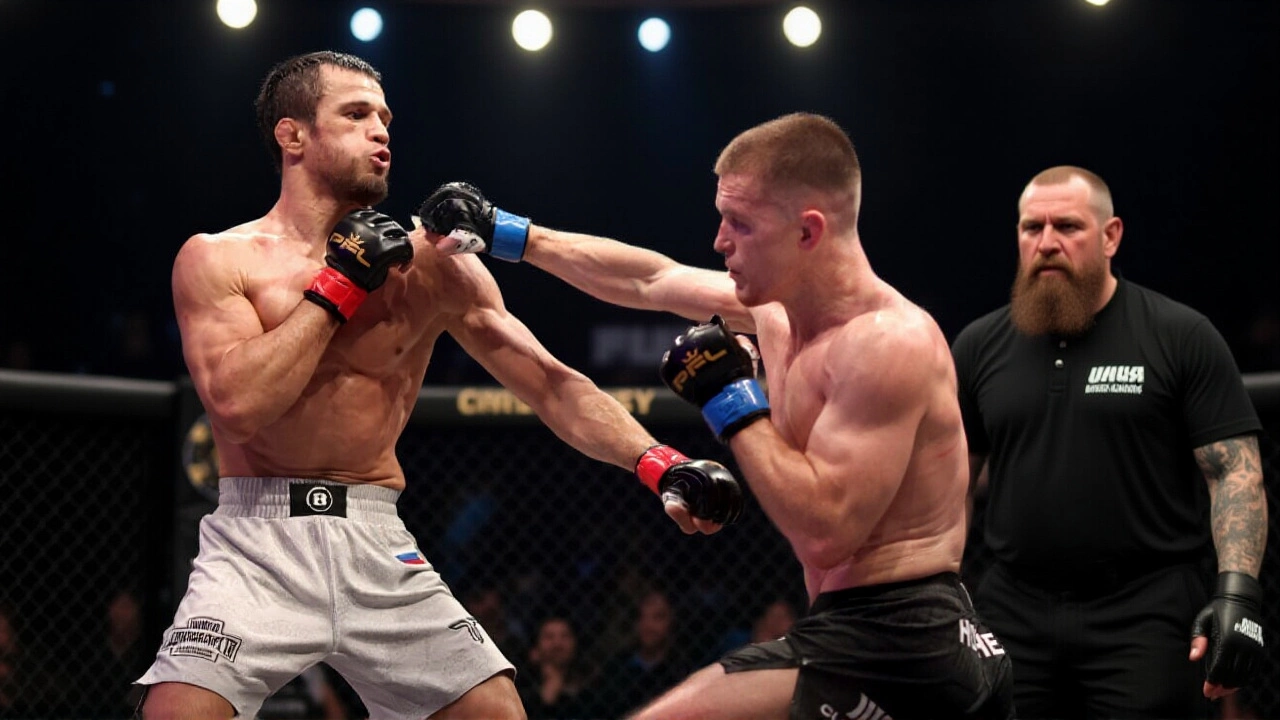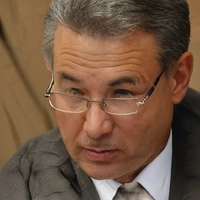When Usman Nurmagomedov, Bellator Lightweight Champion, Bellator MMA sat down for a post‑fight interview, he admitted he came perilously close to losing to Irish challenger Paul Hughes at the Bellator Champions SeriesBelfast. The bout, held on September 21, 2024, turned into a tactical chess match that tested the Russian star’s famed Dagestani wrestling against the Irishman’s newly honed striking and takedown defense.
Background and First Encounter
Usman, 26, entered the fight riding an 18‑0 record and a reputation built on crushing opponents with relentless grappling. His cousin, former UFC legend Khabib Nurmagomedov, often loomed in the background of interviews, reminding fans that the Nurmagomedov name carries a legacy of dominance. Paul Hughes, 28, was a rising star from Northern Ireland with a 13‑1 record and a reputation for ferocious boxing.
The clash in Belfast became more than a title defense; it was a cultural showdown. Hughes’ home crowd roared as he repeatedly thwarted Usman’s takedown attempts, forcing the champion to fight on the feet—a scenario the Russian rarely enjoys.
Why Nurmagomedov Struggled
In the post‑fight press conference, Usman said, “I underestimated his striking and missed the cues that he’d improved his wrestling.” The champion’s camp at the American Kickboxing Academy in San Jose later acknowledged that their game‑plan relied heavily on early takedowns, a strategy that Hughes had specifically trained to neutralize.
Statistically, Hughes landed 65 of 112 significant strikes, while Nurmagomedov managed only 38. Takedown accuracy tells a similar story: Hughes defended 93% of Usman’s attempts, a stark contrast to the champion’s usual 80‑plus percent success rate.
Analysts point to three key factors:
- Improved takedown defense. Hughes’ work under head coach John Kavanagh at SBG Ireland emphasized sprawls and underhooks that left Usman scrambling.
- Higher volume striking. Hughes threw 250 total punches, keeping the champion on the defensive for most of the first two rounds.
- Cardio edge. In the championship rounds, Hughes appeared fresher, landing combos while Usman’s output dipped.
Usman’s own footage after the fight shows his coaches drilling entry‑level feints and double‑leg setups designed to disguise his approach – a clear sign they’re overhauling the striking‑to‑grappling transition.
Reactions from Camps and Analysts
Dominance MMA, the management firm representing Usman, released a statement saying the champion is “eager to prove that the Belfast bout was an outlier, not a sign of vulnerability.” The firm, Dominance MMA, has already booked additional striking coaches, including former Olympic boxer Abdul Aziz, to work with the Russian in the coming weeks.
Meanwhile, Hughes’ camp was quick to claim the fight proved the Irishman belongs among the division’s elite. “I felt I was winning until the final bell,” Hughes told reporters. “My cardio and striking will only get better, and I’m ready for round two.”
Media outlets such as MMA Fighting and Sherdog gave the fight a 48‑52 split in favor of Hughes, underscoring how close the champion came to a historic upset.
What the Rematch Could Look Like
Both camps have hinted at timelines. Bellator has not officially set a date, but insiders suggest a spring 2025 slot could work, giving Usman ample time to integrate new striking drills. The champion’s camp plans to run sparring sessions with SBG Ireland’s grapplers to simulate Hughes’ defensive style.
If a rematch materializes, we can expect a very different tactical landscape. Usman is likely to employ more level‑changing feints, while Hughes may double‑down on his upgraded wrestling, perhaps even attempting more clinch work to smother the champion’s entries.
- Key statistic: Hughes landed 58% of his significant strikes versus Nurmagomedov’s 41%.
- Potential date: Early to mid‑2025, pending Bellator scheduling.
- Location speculation: A neutral venue like Las Vegas could favor the champion, whereas a return to Belfast would give Hughes a home‑crowd boost.
Regardless of geography, the fight will likely feature a higher volume of striking exchanges than the first meeting, forcing Usman to prove he can adapt his wrestling under pressure.
Historical Context and Stakes
The Nurmagomedov name has become synonymous with unbeaten streaks. Khabib retired at 29 with a 29‑0 record, and his younger cousin has been on a similar trajectory. A loss to Hughes would mark the first blemish on Usman’s record and could shift the lightweight hierarchy within Bellator.
On the other side, Hughes is just 28 and sits at 13‑1. A win over a champion of Usman’s pedigree would catapult him into the conversation for “fighter of the year” honors and likely earn a multi‑million‑dollar contract extension with Bellator.
Fans are already debating: will the champion’s wrestling legacy withstand a modern, well‑rounded opponent? Or will Hughes’ evolution signal a new era where traditional Dagestani grappling is no longer the automatic path to victory? The answer will come when both athletes step back into the Octagon.
Frequently Asked Questions
How does this potential rematch affect the Bellator lightweight division?
A second clash would likely determine the division’s clear #1 contender. If Usman wins, his dominance is reaffirmed, keeping the title picture stable. A Hughes victory would shake up the rankings, opening doors for other fighters like Yaroslav Amosov to challenge for the belt.
What specific changes is Usman making in his training?
Usman’s camp has added a dedicated striking coach from the Philippines, increased sparring with SBG Ireland’s wrestlers, and introduced high‑intensity interval drills to boost cardio, aiming to better absorb Hughes’ pace.
Why did Hughes’ takedown defense improve so dramatically?
Under John Kavanagh’s guidance, Hughes incorporated extensive drilling of sprawls and underhook chains, plus strength‑and‑conditioning work targeting the hips, allowing him to counter Usman’s level changes more effectively.
When could the rematch realistically be scheduled?
Bellator typically spaces title defenses 6‑8 months apart. With the first fight in September 2024, a spring 2025 slot—around March or April—seems the most plausible timeframe.
What does a loss mean for Usman’s legacy?
A single defeat would end his unbeaten run but not erase his impact. It would, however, force a narrative shift from invincibility to resilience, and future fights would be judged on his ability to rebound.
A single defeat would end his unbeaten run but not erase his impact. It would, however, force a narrative shift from invincibility to resilience, and future fights would be judged on his ability to rebound.

